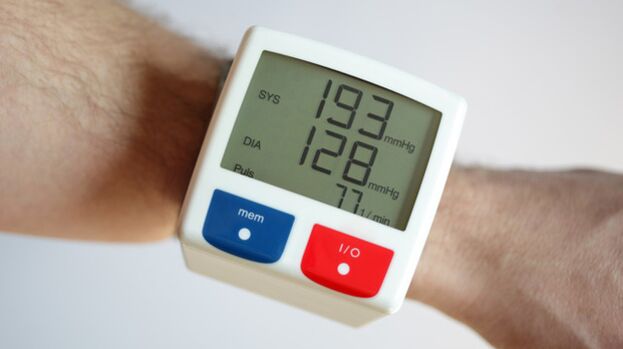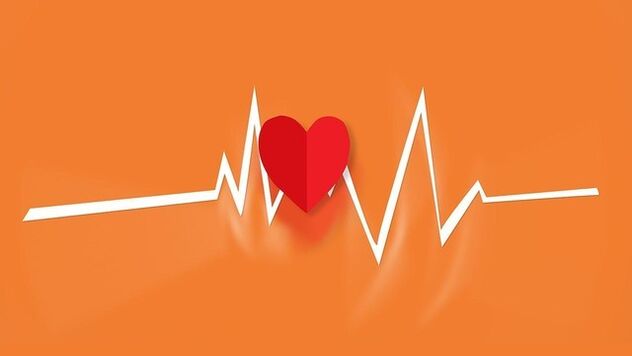
- disease:hypertension
- The surprising part is:Cardiovascular system, target organs (brain, kidney, other organs)
- reason:Nerve overload, hormonal imbalance, vascular dystonia of various causes
- symptom:Headache, dizziness, weakness, spots in front of eyes
- complication:Cerebrovascular accident, myocardial infarction, kidney disease
- doctor:cardiologist
- treat:Be conservative and change your lifestyle
- prevention:Pay attention to your diet and check in time
Hypertension – What kind of disease is it?
What blood pressure is considered hypertension?
causes of high blood pressure
- Impaired vascular tone due to brain or spinal cord injury. High blood pressure can also be caused by cervical osteochondrosis—continuous tension in the back and neck muscles can cause vasospasm.
- Hormone imbalance during pregnancy, menopause, menstruation, or taking oral contraceptives.
symptom
- Occipital and temporal headaches;
- Persistent weakness, decreased performance, and feeling tired even in the morning;
- Dizziness with mild nausea;
- Tinnitus, hearing problems;
- Flashing spots in front of the eyes and blurred vision;
- Changes in emotional state, becoming anxious and nervous for the most trivial reasons;
- Rapid pulse, periodic chest pain;
- Increased sweating and chills;
- Feeling of lack of air and inability to take deep breaths;
- Periodic nosebleeds.
important!For typical high blood pressure headaches, taking painkillers can temporarily relieve the symptoms of high blood pressure, but painkillers do not eliminate the underlying cause. Prolonged attempts to relieve the condition with medications may worsen the course of the disease and complicate further treatment.
risk factors
- ground.For men, hypertension most often occurs between the ages of 40 and 50, and they are more susceptible to the disease. For women, most often the first symptoms appear during menopause and are related to the hormonal changes during this period.
- Living under constant stress:Hard work requiring sustained concentration, family problems, personal life difficulties, financial problems, etc.
- Genetic susceptibility.If both or at least one of the parents has high blood pressure, the risk of developing this disease increases significantly.
- High levels of "bad" cholesterol in the blood.Atherosclerotic plaque on blood vessel walls is one of the main reasons why blood pressure gradually increases with age.
- A sedentary lifestyle, working in front of the computer for long periods of time without taking a break to go for a walk in the fresh air.Lack of physical activity prevents enough oxygen from entering the blood and slows circulation. Hyperemia negatively affects the tone of blood vessels, and the walls of blood vessels gradually lose their elasticity.
- Overweight and obesity.People with a high body mass index almost always have high blood pressure. This is because heavy weight requires an increase in circulating blood volume, which significantly increases the load on the heart. Additionally, being overweight is often caused by poor nutrition, which can lead to the development of atherosclerosis and impair blood flow.
- A diet that contains too many salty and fatty foods.Salt can become trapped in the body and cause swelling. Excessive salt intake is associated with a faster pace of life, failure to maintain healthy eating habits, and an unbalanced diet.
- Side effects after taking certain medications.NSAIDs, some cough and headache medications, especially those containing caffeine or codeine, are not recommended for people who are prone to high blood pressure.
- smokes.Nicotine and tar enter the bloodstream with tobacco smoke, causing vasospasm and increased blood pressure.
- Alcohol abuse.Nearly all people who drink alcohol regularly are diagnosed with high blood pressure.
- kidney disease(renal artery stenosis) leading to deterioration of blood supply to the kidneys and compensatory "increase" in blood flow;
- Endocrine System-Adrenocortical tumors, thyroid disease, and some other hormonal imbalances can cause elevated blood pressure;
- nervous system- Encephalitis, brain tumors, etc.
important!Normalization of blood pressure in secondary hypertension depends on treatment of the underlying disease. Taking blood pressure medications without a doctor's prescription will not have the desired effect.
What to do if you have high blood pressure
- Gently massage the head and neck area. Circular massage movements will increase blood flow and relieve vasospasm.
- You can take a hot bath with a sea salt solution. Water temperature must be monitored very carefully; it should not be significantly higher than body temperature. Bath water that is too hot will only make the condition worse.
- Applying a mustard poultice to the back of the neck or ankle area will help dilate the arteries and normalize blood flow.
important!Watching TV or reading while staring at your smartphone or laptop is not recommended when your blood pressure is elevated. Excessive eye strain can cause blood pressure readings to rise further.
What to do before the doctor arrives
- Place 1 vasodilator tablet under the tongue until completely absorbed;
- Lie on your back with a high pillow under your head;
- Open windows and unbutton clothes to let fresh air circulate;
- Hot water foot bath for 10-15 minutes;
- Drink an alcoholic solution of motherwort or valerian.
important!Refusing treatment during a hypertensive crisis can lead to a stroke or heart attack.
Precaution
- Keep a blood pressure diary and record sphygmomanometer readings, including pulse rate, twice daily;
- Eat right, normalize your weight and give up bad eating habits - overeating, eating too much fatty foods, lots of sweets and salty foods;
- Abstain from alcohol and tobacco – Alcoholic beverages, even in small doses, can have an extremely negative impact on vascular conditions;
- Make time regularly for physical activity and walks in the fresh air, preferably in a gym under the supervision of an experienced trainer;
- Avoid stress as much as possible – regular communication with friends and family, relaxing outdoors, and normalizing team and family relationships will help.
Treatment of high blood pressure

pills and medicines
- Angiotensin-converting enzyme inhibitors (ACE inhibitors)- Drugs that inhibit the production of certain vasoconstrictor hormones in the body;
- Sartans- Receptor blockers that sense hormones that affect vascular tone;
- calcium antagonist- Dilate blood vessels and reduce resistance of blood vessel walls;
- DihydropyridinesLong- and short-acting drugs selectively affect vascular conditions.
diet
- Animal fats, palm oil, butter and coconut oil, margarine;
- Sweets, white bread, milk chocolate and other sweets;
- Salt - taking into account its content in the finished product, no more than 5 g per day.
- Marine fish, rich in healthy fatty amino acids;
- Fresh seasonal fruits, vegetables (at least 5 per day), herbs;
- Vegetable oils - olive oil, flaxseed oil, sunflower oil, corn oil, sesame oil;
- High-fiber foods (including brown rice, durum wheat pasta, in addition to vegetables and fruits);
- Whole wheat porridge.
folk remedies
- garlic tincture;
- Boil a mixture of beets, honey and lemon;
- oatmeal soup;
- Viburnum infusion;
- Clove decoction and some other medicines.
What not to do if you have high blood pressure
complication
- Atherosclerosis, heart failure, angina;
- visual impairment;
- diabetes and other endocrine diseases;
- Cerebral hemorrhage, encephalopathy, etc.



























